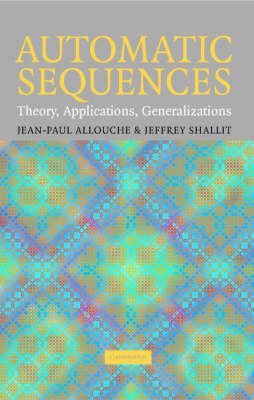
Automatic Sequences
Theory, Applications, Generalizations
Seiten
2003
Cambridge University Press (Verlag)
978-0-521-82332-6 (ISBN)
Cambridge University Press (Verlag)
978-0-521-82332-6 (ISBN)
This is a book about the sequences of symbols that can be generated by simple models of computation called 'finite automata'. It starts from first principles and develops the basic theory, then demonstrates applications to problems in number theory and physics. Suitable for graduates or advanced undergraduates.
Uniting dozens of seemingly disparate results from different fields, this book combines concepts from mathematics and computer science to present the first integrated treatment of sequences generated by 'finite automata'. The authors apply the theory to the study of automatic sequences and their generalizations, such as Sturmian words and k-regular sequences. And further, they provide applications to number theory (particularly to formal power series and transcendence in finite characteristic), physics, computer graphics, and music. Starting from first principles wherever feasible, basic results from combinatorics on words, numeration systems, and models of computation are discussed. Thus this book is suitable for graduate students or advanced undergraduates, as well as for mature researchers wishing to know more about this fascinating subject. Results are presented from first principles wherever feasible, and the book is supplemented by a collection of 460 exercises, 85 open problems, and over 1600 citations to the literature.
Uniting dozens of seemingly disparate results from different fields, this book combines concepts from mathematics and computer science to present the first integrated treatment of sequences generated by 'finite automata'. The authors apply the theory to the study of automatic sequences and their generalizations, such as Sturmian words and k-regular sequences. And further, they provide applications to number theory (particularly to formal power series and transcendence in finite characteristic), physics, computer graphics, and music. Starting from first principles wherever feasible, basic results from combinatorics on words, numeration systems, and models of computation are discussed. Thus this book is suitable for graduate students or advanced undergraduates, as well as for mature researchers wishing to know more about this fascinating subject. Results are presented from first principles wherever feasible, and the book is supplemented by a collection of 460 exercises, 85 open problems, and over 1600 citations to the literature.
Preface; 1. Stringology; 2. Number theory and algebra; 3. Numeration systems; 4. Finite automata and other models of computation; 5. Automatic sequences; 6. Uniform morphisms and automatic sequences; 7. Morphic sequences; 8. Frequency of letters; 9. Characteristic words; 10. Subwords; 11. Cobham's theorem; 12. Formal power series; 13. Automatic real numbers; 14. Multidimensional automatic sequences; 15. Automaticity; 16. k-regular sequences; 17. Physics; Appendix. Hints, references and solutions for selected exercises; Bibliography; Index.
| Erscheint lt. Verlag | 21.7.2003 |
|---|---|
| Zusatzinfo | Worked examples or Exercises; 170 Line drawings, unspecified |
| Verlagsort | Cambridge |
| Sprache | englisch |
| Maße | 179 x 266 mm |
| Gewicht | 1157 g |
| Themenwelt | Mathematik / Informatik ► Informatik ► Theorie / Studium |
| Mathematik / Informatik ► Mathematik ► Arithmetik / Zahlentheorie | |
| ISBN-10 | 0-521-82332-3 / 0521823323 |
| ISBN-13 | 978-0-521-82332-6 / 9780521823326 |
| Zustand | Neuware |
| Haben Sie eine Frage zum Produkt? |
Mehr entdecken
aus dem Bereich
aus dem Bereich
Grundlagen – Anwendungen – Perspektiven
Buch | Softcover (2022)
Springer Vieweg (Verlag)
34,99 €
Eine Einführung in die Systemtheorie
Buch | Softcover (2022)
UTB (Verlag)
25,00 €
was jeder über Informatik wissen sollte
Buch | Softcover (2024)
Springer Vieweg (Verlag)
37,99 €


